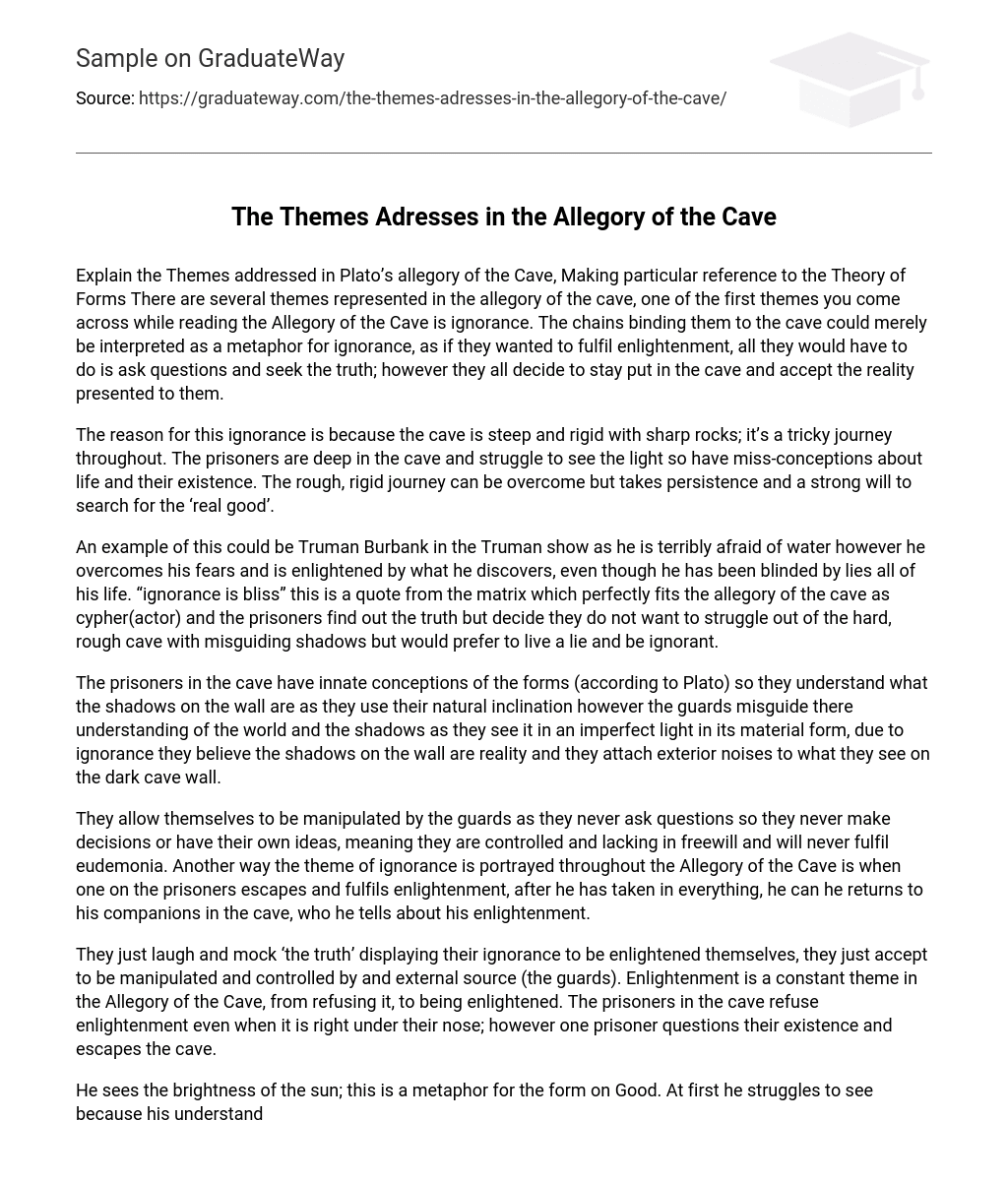Explain the Themes addressed in Plato’s allegory of the Cave, Making particular reference to the Theory of Forms There are several themes represented in the allegory of the cave, one of the first themes you come across while reading the Allegory of the Cave is ignorance. The chains binding them to the cave could merely be interpreted as a metaphor for ignorance, as if they wanted to fulfil enlightenment, all they would have to do is ask questions and seek the truth; however they all decide to stay put in the cave and accept the reality presented to them.
The reason for this ignorance is because the cave is steep and rigid with sharp rocks; it’s a tricky journey throughout. The prisoners are deep in the cave and struggle to see the light so have miss-conceptions about life and their existence. The rough, rigid journey can be overcome but takes persistence and a strong will to search for the ‘real good’.
An example of this could be Truman Burbank in the Truman show as he is terribly afraid of water however he overcomes his fears and is enlightened by what he discovers, even though he has been blinded by lies all of his life. “ignorance is bliss” this is a quote from the matrix which perfectly fits the allegory of the cave as cypher(actor) and the prisoners find out the truth but decide they do not want to struggle out of the hard, rough cave with misguiding shadows but would prefer to live a lie and be ignorant.
The prisoners in the cave have innate conceptions of the forms (according to Plato) so they understand what the shadows on the wall are as they use their natural inclination however the guards misguide there understanding of the world and the shadows as they see it in an imperfect light in its material form, due to ignorance they believe the shadows on the wall are reality and they attach exterior noises to what they see on the dark cave wall.
They allow themselves to be manipulated by the guards as they never ask questions so they never make decisions or have their own ideas, meaning they are controlled and lacking in freewill and will never fulfil eudemonia. Another way the theme of ignorance is portrayed throughout the Allegory of the Cave is when one on the prisoners escapes and fulfils enlightenment, after he has taken in everything, he can he returns to his companions in the cave, who he tells about his enlightenment.
They just laugh and mock ‘the truth’ displaying their ignorance to be enlightened themselves, they just accept to be manipulated and controlled by and external source (the guards). Enlightenment is a constant theme in the Allegory of the Cave, from refusing it, to being enlightened. The prisoners in the cave refuse enlightenment even when it is right under their nose; however one prisoner questions their existence and escapes the cave.
He sees the brightness of the sun; this is a metaphor for the form on Good. At first he struggles to see because his understanding of the concepts are jaded due to lack of use however after a little persistence his eyes fully open to see everything that surrounds him (this is like when Neo is unplugged in the matrix, he asks why his eyes hurt, the reply is “because you’ve never used them before” this is exactly the same as the people in the cave).
Finally the prisoner lifts his head and looks directly at the sun and realises that this is what illuminates all, this is exactly what the form on the good does, the form of the good illuminates the rest of the concepts (justice, love, beauty etc. )This is why the form on the good is placed at the top due to hierarchy of the forms according to Plato. The prisoner has been enlightened and fully understands Plato’s ideas about concept and Forms; however ignorance gave the others a misguided perception.
Deception is a major theme in the Allegory as the guards use this to manipulate and control the prisoners turning them away from the enlightenment and misguiding their concepts(Theory of Forms). Plato believed that if everything was true and there was no deception then The Form of the Good would be a universal concept and everyone would have the same morals and people would have the same beliefs and views of concepts like beauty or justice. Everything in the material world is contingent and always changing so therefore cannot be true.
This is like the shadows in the cave which are manipulated by the guards as they are forever changing and are never the same from one minute to the next, however the prisoners believe that they are real/ perfect men or women even though they are just fake imitations, however when the prisoner gets out of the cave and is enlightened he sees the exterior world where the concepts are perfect. To us the perfect world has no characteristics it is in our mind, it is a place where everything is perfect and has no sort of deficiency.





